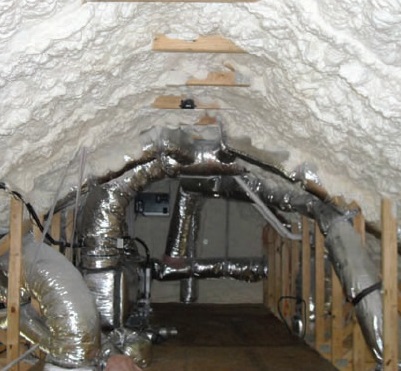Ask Your Spray Foam Insulation Contractor In Phoenix These 6 Questions
The basic precautions for hiring a spray foam insulation company in Phoenix are the same as they would be for any home improvement company. However, there are additional questions you can ask that are specific to a spray foam insulation contractor.
Do they pay their techs by the square foot, or by the hour?
In Phoenix, most high-volume-oriented insulation companies pay their employees by the square foot. As a result, the amount of work they complete each day increases. Unfortunately, the result is low-quality work.

However, sub-standard work is rarely intentional on the technician’s part. Usually, high volume companies train their technicians to install insulation as quickly as possible. So, when they rush, they’re just doing their job.
Besides spray foam insulation, what other products does the contractor install?
Manufacturers make spray foam components. However, spray foam insulation contractors manufacture the foam on the job site. Spray foam insulators should install foam every day to keep a consistent finished product. Therefore, a company specializing in spray foam will have fewer quality control problems than a company that does not.


Additionally, when problems do arise, a specialized company resolves them quickly.
What ratio of the company’s foam insulation work is retrofit vs new construction?
Attic retrofit work is more strenuous and labor-intensive than new construction work. For example, A two-man crew can insulate the walls and attic of most new construction projects in one day. In comparison, the attic retrofit of your existing home will take two technicians, two days, to complete.
Suppose a technician typically works on wide-open new construction projects. In that case, their workmanship declines significantly in a confined attic space. On the other hand, a technician who works in tightly confined attics daily prepares to do a thorough job every day.
How do they ensure they comply with the fire code?
There are strict fire code compliance requirements for spray foam insulation in residential attics. In new construction, the general contractor handles the fire code compliance work. With retrofits, on the other hand, fire code compliance is the responsibility of the spray foam insulation company.
On an attic retrofit project, a new construction approach to fire code compliance will guarantee that your attic is not fire-code compliant. So, ask your contractor how they plan to ensure that your attic is code compliant. Better yet, see if your contractor brings it up.
How do they comply with OSHA worker safety requirements?
OSHA requires that all spray foam technicians working in a confined attic wear a fresh air breathing apparatus. Therefore, verify that your contractor requires their applicators to breathe fresh air while in the attic. In addition to that, tell them that you’ll be monitoring the worker’s safety while they are at your home.


Do they subcontract their insulation removal work to another company?
It is crucial that the company that applies the spray foam insulation also removes the existing insulation. Typically, when foam insulation does not seal all the air leaks in an attic, the leaks are located in the eves.
When the removal crew rushes through the removal quickly, they leave clumps of insulation in the eves. So when the spray foam insulator arrives the next day, they spray over the remaining insulation in the eves – hoping they achieve an air seal.
A competent application leads to a complication-free future.
So, to avoid problems down the road, do your homework ahead of time. Hire a competent spray foam insulator with experience with your type of project. If you take these simple steps, you’ll enjoy the benefits of your spray foam insulation for decades to come.


